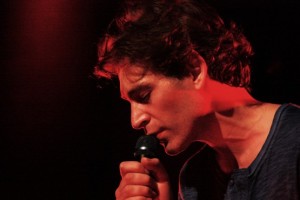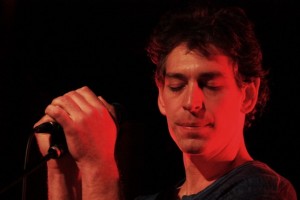CLUB HELSINKI HUDSON
Matisyahu
Monday, December 17, 2012
Review and photos  by Seth Rogovoy
by Seth Rogovoy
(HUDSON, N.Y.) – Expectations were somewhat low going into Matisyahu’s “Acoustic Evening with…” performance at Club Helsinki Hudson on Monday night. Was this to be yet another case of a formerly lively performer now forced by a combination of the harsh economics of touring with a full band and crew and some waning popularity to downscale, artistically, musically, and energetically, what he does onstage (such as we’ve seen in recent years with Toots and the Maytals and Darryl Hall & John Oates)? Was Matisyahu’s mostly reggae-fied and rap-ified stage show going to be watered down into some kind of mushy spiritual folk music?
While the concert was billed as “acoustic,” this didn’t, as it turned out, mean “quiet” or “folky,” although it did have both of those elements at times. His guitar accompanist played an acoustic instrument, albeit one that made full use of the panoply of electronics now available to instrumentalists of his ilk. Matisyahu performed most of the show seated, intoning his verses earnestly and sincerely. And you could actually hear them – the melodies and the words, and his sweet, Paul Simon-like tenor.
But what the standing-room-only crowd got was less folk show than an MTV Unplugged aesthetic, one that has always relied on acoustic-based rearrangements of rock and pop while not adhering to traditionalist folk music rules, one that has substituted the dynamics of a rock show for the intimacy of a listening room, which was how Helsinki was set up on Monday night.
What one got was the crystal-clear sound of guitar and vocals and Matisyahu’s considerable talent as a beatboxer – a human percussion ensemble, mainly through the use of vocal techniques mimicking drums and turntable sounds such as scratching. That and Matisyahu’s humble and endearing personality – overflowing with equanimity, if that paradox is possible – in the early days of his post-religious phase, shorn of his beard and the outer trappings of religiosity (no head covering, no ritual fringes, no black suit – the uniform of the Hasidim with whom he once strongly identified).
Matisyahu directly confronted his “change of appearance,” as it was posed to him in a mid-set Q&A session with the audience, giving an eloquent explanation of the spiritual search that led him to study of Judaism, trying on the inner and outer clothing of religious tradition, struggling with the seemingly incompatible demands that tradition makes on a modern artist, ultimately choosing to shed the outer trappings while clearly still deeply believing, respecting, and building upon those profundities along his ongoing spiritual and creative journey.
And from the looks of his audience, which had the diverse but distinctive appearance of the population of, say, a yoga studio, or a Grateful Dead concert, there were probably many there who knew exactly what he was talking about.
 Matisyahu was an engaging entertainer, bantering with the lively crowd, including some who tread perilously close across the fine line between enthusiasm and heckling. He welcomed someone up to the stage with his guitar to sit in one of his best-known songs, and he went along with several requests from young women in the crowd to have their pictures taken with him. He seemed unflappable, grateful, and wholly committed to his songs of praise, songs that rely heavily on Jewish scripture and philosophy for their content while wearing the trappings of modern-day pop, reggae and hip-hop.
Matisyahu was an engaging entertainer, bantering with the lively crowd, including some who tread perilously close across the fine line between enthusiasm and heckling. He welcomed someone up to the stage with his guitar to sit in one of his best-known songs, and he went along with several requests from young women in the crowd to have their pictures taken with him. He seemed unflappable, grateful, and wholly committed to his songs of praise, songs that rely heavily on Jewish scripture and philosophy for their content while wearing the trappings of modern-day pop, reggae and hip-hop.
Matisyahu is a fine, emotive singer with his own sweet voice, and then on a dime assumes the inflections of hip-hop or Jamaican toasting. In this post-racial era, this is no longer minstrelsy, but rather this is being fluently multilingual – or, perhaps even more appropriately, being universally musical.
Oh, yeah, one more thing – any worries that this “acoustic” show would lack something at the bottom of the mix were dispelled early on, when Matisyahu invited 10-time Grammy Award-nominated Hudsonian Me’Shell Ndegeocello to join him onstage for the first of several collaborations, with the electric bass guitarist providing the heaviest, funkiest bottom that has likely ever underpinned a Matisyahu concert.
Seth Rogovoy is an award-winning music critic and the author of Bob Dylan: Prophet Mystic Poet.
